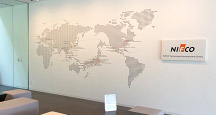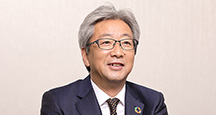Conducted in: July 2024
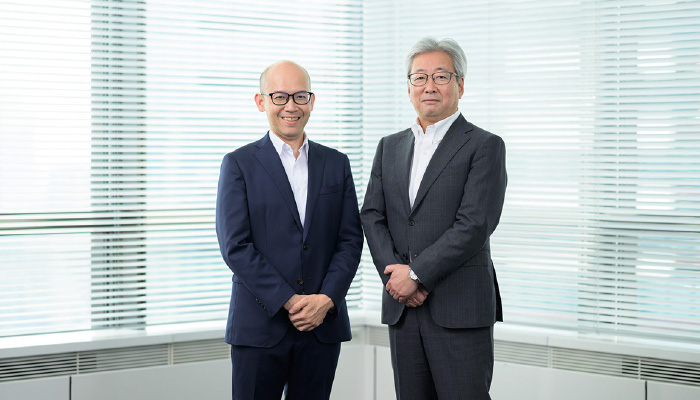
Masaharu Shibao (on the right)
President and CEO,
Nifco Inc.
Kohei Yatsubayashi (on the left)
President and Director,
S-Pool Blue Dot Green, Inc.
Profile:
After graduating from university, Kohei Yatsubayashi joined the Ministry of the Environment in 2006, where he was involved in the design of carbon offsetting systems. He then moved to the Shimokawa Town Office in Hokkaido, and after setting up a general incorporated association, he became the President and Director of Blue Dot Green Inc. (name changed to S-Pool Blue Dot Green, Inc. in 2022) in 2020. There he provided consulting services related to environmental management, including CDP responses and GHG emissions calculations.
Taking a bird's-eye view of sustainability,
we will consider what kind of value Nifco can create.
Nifco has pledged to achieve carbon neutrality by 2050 and is promoting various initiatives that include reducing its environmental impact. How can such sustainability activities and information disclosure be linked to the enhancement of corporate value? We invited Mr. Yatsubayashi from S-pool Blue Dot Green, who spoke with Mr. Shibao, our President and CEO.
Launching a new service with a cross-border study program
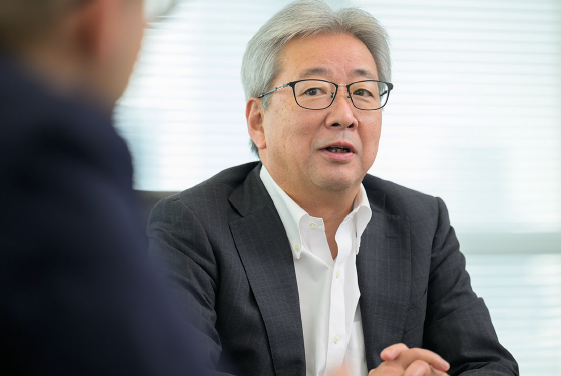
Shibao: Nifco has a cross-border study program that allows employees to visit other companies and study things that they cannot find at Nifco in order to cultivate the "ability to create change." Nifco's connection with S-Pool Blue Dot Green began when one of our employees was accepted in 2021 as a recipient of that study program.
Yatsubayashi: Yes, that's right. This was the first time for us to host someone from an outside company in this way.
Shibao: That employee’s goal was to become involved in new business planning, and did not seem to have limited himself to focusing only on the environmental field.
Yatsubayashi: It was a happy coincidence in that sense, I think. But from there, the project was set in motion and we were able to launch our new business.
Shibao: Could you please talk about the kind of business you’re engaged in?
Yatsubayashi: Sure, it’s an LCA (Life Cycle Assessment) support service. This is a quantitative assessment of environmental impacts such as CO2 emissions over the entire life cycle of a product. Despite the fact that the automotive industry has a large role to play in reducing environmental impact, it had not yet been able to determine the CO2 emissions of each its products. So we have created a tool to calculate emissions using Nifco as a model. Since our main business is to support the disclosure of information related to sustainability, including TNFD, this was truly a service without precedent.
Shibao: I understand that you also collaborated with Nifco's manufacturing division and ESG Promotion Office, and visited the factory to conduct a survey.
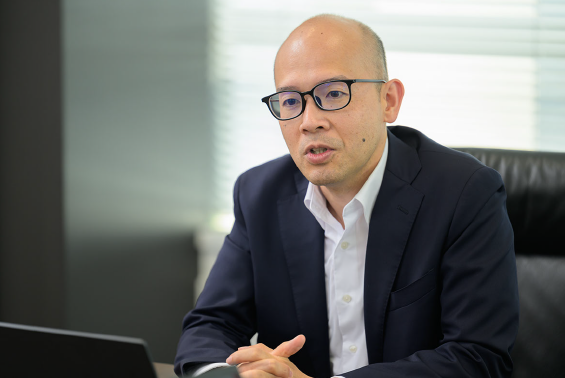
Yatsubayashi: Yes. I was not able to go, but the members who visited to conduct the survey seemed to find it a very refreshing experience. They said they were surprised to see that Nifco had established a solid system not only for the manufacturing process but also for recycling/reuse of plastics.
Shibao: What is obvious to Nifco employees who see it up close and personal may not be obvious to an outsider. Such feedback is also valuable to Nifco. Although this LCA evaluation method has not yet been fully implemented, the awareness of environmental issues that our employee has learned from S-Pool Blue Dot Green is sure to spread throughout the company in the years to come.
View sustainability through the lens of strategies informed by competitive advantages
Yatsubayashi: Many pieces of legislation on sustainability-related information disclosure have been introduced in recent years, especially in Europe. Could this have an impact on Nifco's business as well?
Shibao: Certainly, standards are becoming stricter every year. However, frankly speaking, there are political factors involved, and looking at the movements of European automobile manufacturers, it seems that they are not all responding to the same standards. I believe that information disclosure, as well as sustainability initiatives themselves, should be thoroughly addressed, while at the same time always considering how to link sustainability to economic value and other benefits. Activities that do not lead to an increase in corporate value over the medium to long term will not last.
Yatsubayashi: I think you’re right. Recently in Japan, the attitude toward sustainability has been changing, as evidenced by the government's announcement of more than 150 trillion yen in public and private investments to promote GX (Green Transformation). I believe that it’s essential to consider how sustainability can be linked to a company's competitive advantage.
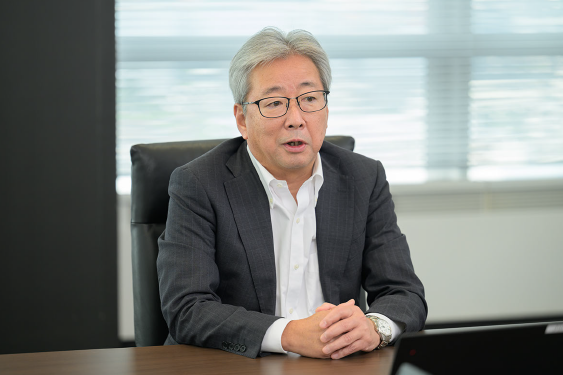
Shibao: I think it’s necessary to have a strategy that is not just about the top, but also about the bottom line, while keeping an eye on social trends. This may be slightly off topic, but a good example is using fewer plastic bags at supermarkets. Not everybody was on board with the idea at first, but it's now a universal practice. This is probably because many people are realizing the benefits. The same is true for companies. If they feel that their efforts will lead to an increase in value, they will naturally expand their efforts.
Yatsubayashi: In the case of Japanese companies, it seems that many of them started their initiatives with the attitude of "we have to do it because other companies in our industry are doing it.” Recently, this attitude has been changing, and an increasing number of companies are beginning to think about how their products and services can help solve social issues, and are quantifying these issues while proactively disseminating information about them.
Shibao: Up to now, I think our efforts have been more of a “pull” to match the trends originating in Europe. I think we need to think more proactively and change our mindset to one of strategically “pushing”.
Yatsubayashi: I think you’re right. Until recently, there has been a tendency in Japan to view sustainability as a series of separate issues to be addressed, such as climate change and biodiversity. Instead, I think we should take a more holistic view of sustainability, think about how our company can be involved in the process, quantify it, and communicate it to society.
Growing interest in sustainability is an opportunity
Shibao: I believe that the growing interest in sustainability, including climate change, is not a risk for Nifco, but rather an opportunity. This is because Nifco does not have any special technology or facilities that give it a great advantage, and its greatest asset is its "people." Unique technologies and facilities cannot cope with sudden changes, but "people" are always flexible. I believe that even in the face of risk, we can always turn in a positive direction. In fact, looking back on Nifco's history, we have always overcome crises with the wisdom and ideas of our employees, which has led to new growth.
Yatsubayashi: Because your employees are equipped with the ability to learn and respond. Changing subjects, Nifco's main products are plastic parts for automobiles. Plastics are attracting a lot of attention in terms of environmental issues, but do you think that their potential will continue to expand depending on the wisdom of people?
Shibao: That is my opinion. Plastic has only been in existence for about 200 years and has only been in practical use for about 100 years. It is a much younger material than iron. Compared to iron, plastic is lightweight, rust-free, and has many other outstanding features. That is why it plays such an active role in society and in our daily lives. Plastic still has many possibilities. For example, it is much easier to process than iron, and therefore less energy is used in the manufacturing process. However, it is also true that there are major challenges, such as the waste problem it poses. I believe that this is something that we as a company need to work on.
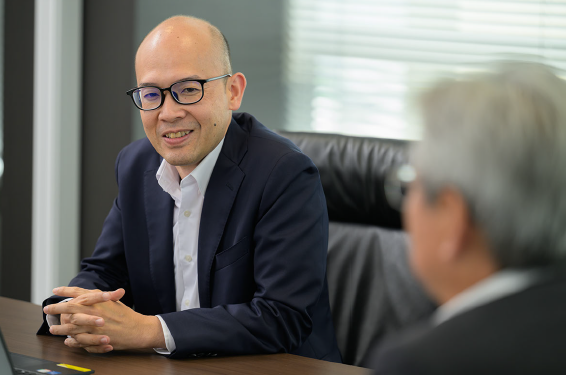
Yatsubayashi: Recently, the Ministry of Economy, Trade and Industry (METI) launched measures to promote the use of recycled plastics in order to realize a circular economy. I believe that this trend will continue to intensify in the future, and if we can establish a system to continue using plastics in a cyclical manner, I believe that these materials can coexist with society. The environment surrounding plastics will continue to change in the future, but I think it’s good to have Japan offering its unique perspective and disseminating information, and I feel that such an attitude will never have a negative impact on Japanese companies.
Nifco's Climate Change Goals
Shibao: Nifco has pledged to achieve carbon neutrality by 2050 to ensure that its business functions properly to meet the challenge of climate change.
Yatsubayashi: Looking at the disclosed reports, Scope 1 and 2 CO2 emissions decreased 4.20% in 2021 and 6.50% in 2022 compared to the previous year, so it seems that your efforts are going well.
Shibao: Certainly, the latest figures suggest we are making steady progress, and I feel that an awareness of environmental issues is taking root within the company.
Yatsubayashi: However, since these reduction rates tend to shrink as the years go by, one could say the real work begins now.
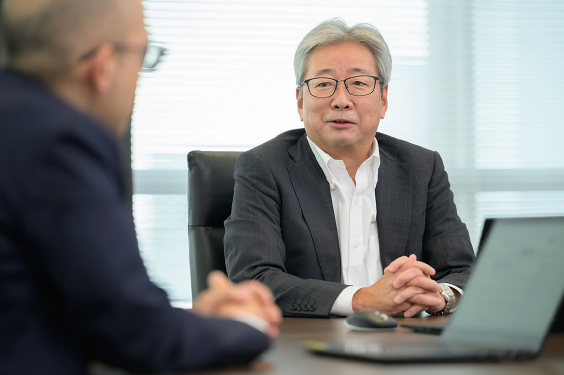
Shibao: I completely agree. In the case of Nifco, Scope 1 emissions are not applicable to our manufacturing process, so we are implementing thorough energy-saving activities. We are also planning to reduce Scope 2 emissions by using solar power generation and other means.
But the difficult part is Scope 3 emissions. Nifco relies on partner companies outside the group for about 50% of its manufacturing processes. It is not easy to manage emissions throughout such a broad supply chain. I think this is an issue not only for Nifco, but for the entire automotive industry.
Yatsubayashi: Indeed, I feel that Scope 3 emissions are a common issue in Japan’s manufacturing industry. When I visited a manufacturer the other day, I learned that the company has many overseas suppliers and has created a multi-lingual educational video to first spread awareness. I think we need to think about a long-term roadmap and sit down and work on it.
Turning sustainability into opportunity
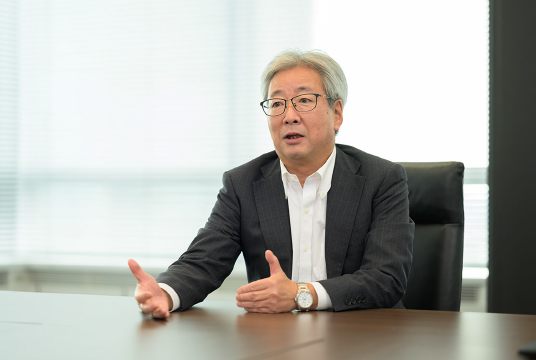
Shibao: Earlier, you mentioned that it is good to have a unique perspective and to disseminate information, but there is one thing I have been thinking about. The plastic products we make emit CO2 during the manufacturing process, but on the other hand, they can help reduce CO2 emissions if they are installed in automobiles. By using lightweight and highly processable plastics, we can reduce weight and improve aerodynamic performance, leading to improved fuel efficiency for automobiles, which in turn reduces CO2 emissions. In this way, if we can better quantify the impact over the entire life cycle, I believe we can create new benefits.
Yatsubayashi: That's a quantitative way of looking at the so-called reduction contribution. I think it’s actually quite difficult to quantify this for Scope 3 emissions, but it’s very important to express our own strengths in our own way. The LCA tool jointly developed by our company and Nifco, which was mentioned at the beginning of this conversation, may be the starting point of such a project.
Shibao: Regarding the supply chain, we are already working on some initiatives in logistics and other areas. We have begun to devise ways to improve the packaging methods for products supplied to automobile manufacturers to supply more products in a single transport and to reduce the use of plastic and other packaging materials.
Yatsubayashi: So this is an initiative that also involves automakers downstream in the supply chain.
Work throughout the supply chain while refining your own strengths
Shibao: What kind of attitude do you think is important for Japanese companies to have if they want to make their presence felt in the current trend toward sustainability?
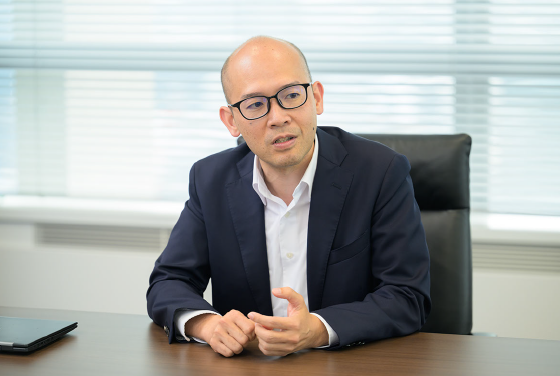
Yatsubayashi: I think we should identify our strengths, quantify them, and proactively disseminate information about them without being too distracted by global trends. Of course, this will require us to make a solid effort to reduce CO2 emissions and address other environmental issues. Talking with you today has made me feel that Nifco has many powerful assets needed to accomplish this.
Shibao: Thank you very much. What I felt today is that there is much more to sustainability than just what one company can do. There needs to be a coordinated effort throughout the supply chain.
For example, I mentioned earlier the environmental value of products, but at present, the automotive industry has not yet established a system to evaluate such value. Technical value and cost value are rigorously evaluated by the design department and purchasing department, respectively. If environmental value can be evaluated in the same way, I think a big change will take place.
Yatsubayashi: Engagement in the supply chain tends to be thought of as a flow from downstream to upstream, but it can also happen in the opposite direction, such as a proposal from Nifco to an automobile manufacturer. This ability to make proposals is one of Nifco's strengths, and I have high hopes for it. In order to evaluate the environmental value of products, we need to have a system for quantifying that value and incorporating it into prices. There are many things that need to be addressed, but this is a major theme that relates not only to the plastic products handled by Nifco, but also to manufacturing as a whole. I think it is important for everyone in society to think about this issue, not just companies.
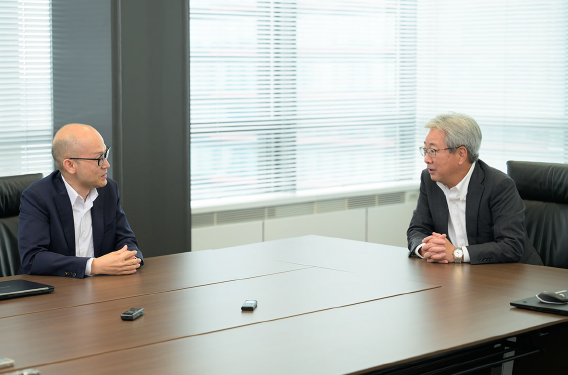
Shibao: Efforts must be made not only at Nifco, but also throughout the industry and society at large. In sustainability, it seems that "everyone" is a crucial keyword.
- CEO: Nifco's Sustainability Management
- General Manager of Finance & Accounting Department: Financial Strategies to Support ESG Management
- Message from Outside Directors
- Roundtable Discussion: Between the President and Employees Involved in Technology
- Dialogue: Next-generation Growth Strategies Focused on Solving Social Issues
- Dialogue: Nifco's concept of human capital



